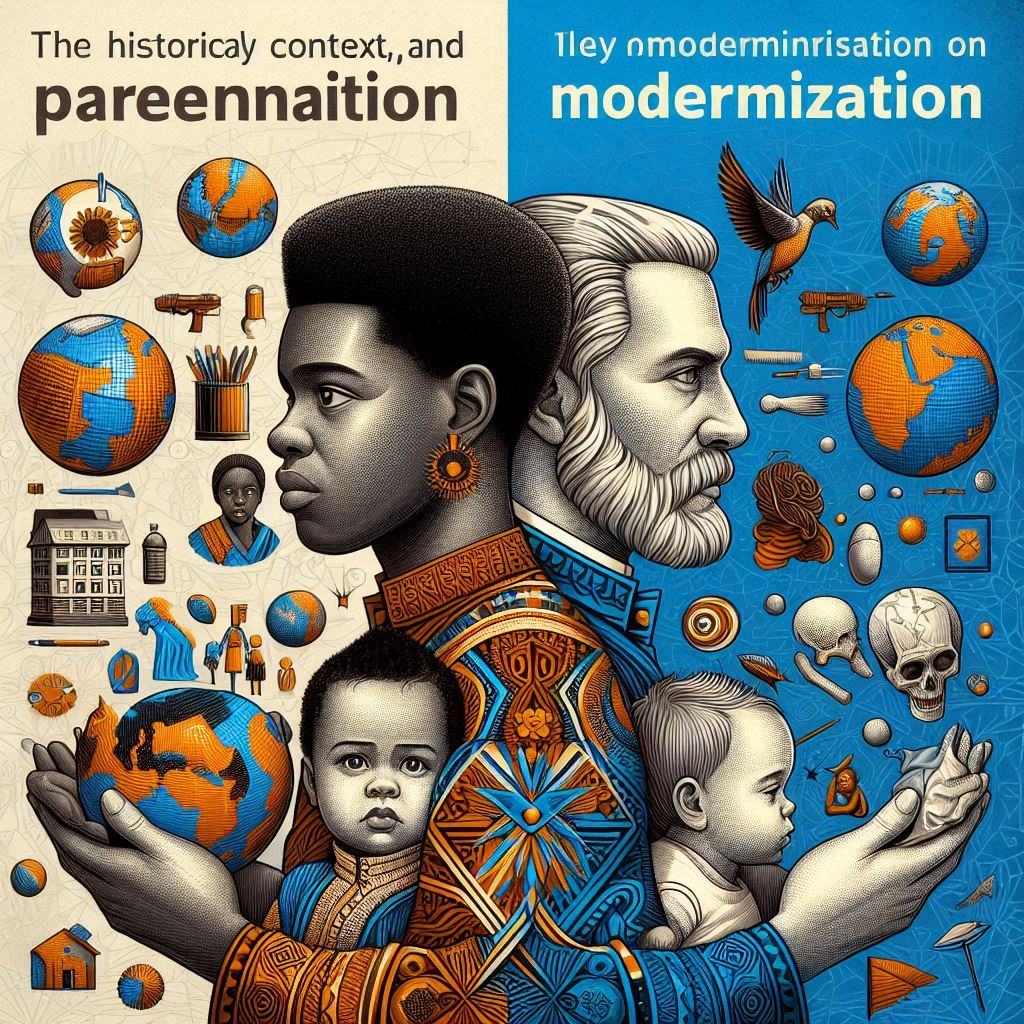
Introduction
The 20th century marked a period of significant transformation in parenting practices across the globe. Both African and Western societies experienced notable shifts in their child-rearing philosophies and methodologies, influenced by changing social norms, scientific research, and cultural dynamics. This comprehensive exploration delves into the historical context, key differences, and the impact of modernization on parenting in these two distinct cultural domains.
As we embark on this journey through time, we’ll examine how parenting styles evolved, the factors that influenced these changes, and the lasting impact on contemporary child-rearing practices. By comparing and contrasting African and Western approaches, we aim to gain a deeper understanding of the diverse ways in which different cultures nurture and shape the next generation.



Western Parenting: From Authoritarian to Authoritative
The Early 1900s: The Reign of Authoritarianism
At the dawn of the 20th century, Western parenting practices were firmly rooted in an authoritarian approach. This style of parenting emphasized:
- Strict discipline
- Unquestioning obedience
- A parent-centric model of control
Parents were encouraged to maintain tight behavioral and psychological control over their children, with little room for emotional expression or individual autonomy. This approach was largely influenced by the prevailing social and cultural norms of the time, which valued order, discipline, and respect for authority.
The Influence of John Broadus Watson
One of the most influential figures in early 20th-century child psychology was John Broadus Watson. His work advocated for a detached, mechanistic approach to child-rearing. Watson’s controversial advice to parents included:
- Withholding affection from children
- Treating children as “young adults”
- Emphasizing routine and structure over emotional bonding
Watson’s behaviorist approach was based on the belief that children could be molded through strict conditioning, with little regard for their emotional needs or individual differences. His 1928 book “Psychological Care of Infant and Child” famously advised:
“Never hug and kiss them, never let them sit on your lap. If you must, kiss them once on the forehead when they say goodnight. Shake hands with them in the morning.”
While Watson’s extreme views were not universally adopted, they reflected and reinforced the broader cultural emphasis on discipline and emotional restraint in parenting during this era.
Mid-20th Century: The Winds of Change
As the century progressed, the rigid and emotionally distant style of parenting faced growing criticism. Several key figures and developments contributed to a shift in parenting philosophies:
Dr. Benjamin Spock: A Revolution in Child Care
The publication of Dr. Benjamin Spock’s “Baby and Child Care” in 1946 marked a significant turning point in Western parenting practices. Spock’s approach was revolutionary for its time, as he:
- Encouraged parents to trust their own instincts
- Emphasized the importance of understanding children’s needs and behaviors
- Advocated for age-appropriate discipline
- Stressed the significance of emotional bonding between parents and children
Spock’s famous opening lines, “Trust yourself. You know more than you think you do,” empowered parents to move away from the rigid, one-size-fits-all approach of the past. His work helped to humanize parenting, acknowledging the individual needs of both children and parents.
John Bowlby and Attachment Theory
Parallel to Spock’s influence, the work of psychoanalyst John Bowlby on attachment theory further reinforced the importance of early infant-caregiver bonding for healthy child development. Bowlby’s research, conducted in the 1950s and 1960s, demonstrated that:
- Secure attachment in infancy is crucial for emotional and social development
- The quality of early relationships shapes a child’s internal working models of self and others
- Disruptions in attachment can have long-lasting effects on mental health and relationships
Bowlby’s work, along with that of his colleague Mary Ainsworth, helped to shift the focus of parenting from mere physical care to the emotional and psychological needs of children.
A.S. Neill and Summerhill School
Another influential figure in the evolving landscape of Western parenting was A.S. Neill, the founder of Summerhill School in England. Neill’s progressive views advocated for:
- Children’s personal freedom
- Minimization of parental authority
- Education based on the principle that learning should be enjoyable
While Neill’s approach was considered radical by many, his ideas contributed to the growing discourse on child-centered education and parenting. Summerhill School, founded in 1921, became a symbol of alternative education and a challenge to traditional authoritarian approaches to child-rearing.
The Rise of Authoritative Parenting
In the 1960s and 1970s, the field of developmental psychology made significant strides in understanding the impact of different parenting styles on child outcomes. Diana Baumrind’s seminal work on parenting typologies introduced the concept of “authoritative parenting,” which gained widespread recognition as an effective and balanced approach.
Baumrind’s Parenting Typology
Baumrind identified three main parenting styles:
- Authoritarian: High in demandingness, low in responsiveness
- Permissive: Low in demandingness, high in responsiveness
- Authoritative: High in both demandingness and responsiveness
The authoritative style, which combined high levels of warmth and responsiveness with firm yet flexible control, was found to be associated with the most positive child outcomes. Authoritative parents were described as:
- Striking a balance between respecting their child’s individuality and setting clear expectations
- Using reasoning and explanation rather than punishment to guide behavior
- Encouraging independence while providing necessary support and guidance
Research consistently showed that children raised by authoritative parents tended to have:
- Higher self-esteem
- Better social skills
- Improved academic performance
- Greater emotional regulation
Contemporary Developments: Beyond Authoritativeness
While Baumrind’s model has been influential, it has not been without criticism. Some scholars have questioned the emphasis on high control and the potential limitations of the authoritative style. This has led to the emergence of more nuanced and flexible approaches to parenting in recent decades:
Conscious Parenting
Conscious parenting, popularized by Dr. Shefali Tsabary, emphasizes:
- Mindful awareness of one’s own emotional triggers and patterns
- Recognizing the child as a separate individual with their own journey
- Focusing on the parent’s personal growth as a means of nurturing the child
Unconditional Parenting
Alfie Kohn’s concept of unconditional parenting challenges traditional notions of reward and punishment, advocating for:
- Loving children for who they are, not what they do
- Working with children to solve problems rather than imposing solutions
- Avoiding the use of control tactics, including praise as a form of manipulation
Attachment Parenting

Developed by Dr. William and Martha Sears, attachment parenting emphasizes:
- Continuous emotional availability and responsiveness
- Extended breastfeeding and baby-wearing
- Co-sleeping and gentle discipline methods
These contemporary approaches reflect a growing emphasis on:
- Adapting to the unique needs of each child
- Maintaining a balance of nurturing and guidance
- Fostering emotional intelligence and resilience
- Recognizing the bidirectional nature of the parent-child relationship
As we move further into the 21st century, Western parenting continues to evolve, influenced by ongoing research in child development, neuroscience, and psychology. The trend appears to be moving towards more individualized, responsive, and emotionally attuned approaches to child-rearing.
African Parenting: The Enduring Influence of Tradition
While Western parenting underwent significant changes throughout the 20th century, traditional African child-rearing practices remained deeply rooted in the cultural and social fabric of the continent. However, this is not to say that African parenting remained static; rather, it evolved in response to changing societal pressures while maintaining core cultural values.
The Extended Family System
One of the defining features of African parenting has been the extended family system. This approach to child-rearing is characterized by:
- Shared responsibility among all family members
- Collective involvement in a child’s upbringing
- Intergenerational transmission of cultural values and life skills
Benefits of the Extended Family System
The extended family system provided numerous advantages:
- Emotional and practical support for parents
- Multiple role models for children
- A strong sense of community and belonging
- Built-in childcare and resource sharing
This collective approach to parenting ensured that children were raised with a strong sense of social responsibility and respect for elders and community members. It also allowed for the preservation and transmission of cultural knowledge and practices across generations.
The Role of Grandparents
In many African cultures, grandparents played a particularly significant role in child-rearing. They were often seen as:
- Repositories of wisdom and traditional knowledge
- Primary caregivers, especially in situations where parents were absent or working
- Mediators between parents and children
- Teachers of cultural values and practices
The close involvement of grandparents in child-rearing helped to maintain continuity in cultural transmission and provided children with a sense of historical rootedness.
Oral Traditions and Storytelling
Another crucial aspect of traditional African parenting was the use of folktales and storytelling as a means of imparting moral values, life lessons, and cultural heritage. This oral tradition served multiple purposes:
- Entertainment: Stories captivated children’s imagination and provided enjoyment
- Education: Tales often contained moral lessons and practical wisdom
- Cultural preservation: Myths and legends kept cultural history alive
- Language development: Storytelling enhanced children’s linguistic skills
Types of Stories and Their Purposes
Different types of stories served various educational and cultural purposes:
- Animal fables: Taught moral lessons and clever problem-solving
- Origin stories: Explained natural phenomena and cultural practices
- Cautionary tales: Warned children about potential dangers or misbehaviors
- Heroic epics: Instilled cultural pride and values of bravery and honor
Through these stories, children learned about their community’s history, values, and expectations, forming a strong cultural identity.
Initiation Rites and Rites of Passage
In many African cultures, initiation rites played a significant role in preparing young people for the responsibilities of adulthood, including parenting. These rituals were particularly important for young girls, marking their transition to womanhood and providing targeted teachings on expected roles and behaviors within the community.
Elements of Initiation Rites
While specific practices varied across cultures, common elements of initiation rites included:
- Separation: Initiates were often secluded from the community for a period of time
- Instruction: Elders imparted knowledge about adult responsibilities, including parenting
- Challenges: Physical and mental tests to prove readiness for adulthood
- Celebration: Rituals marking the successful completion of the initiation process
Teachings on Parenting and Family Life
During these initiation periods, young people received explicit instruction on:
- Child-rearing practices and expectations
- Gender roles within the family and community
- Marital responsibilities and conflict resolution
- Traditional health practices related to pregnancy and childcare
These rites of passage ensured that young adults entered parenthood with a clear understanding of their cultural expectations and responsibilities.
Discipline and Respect
Traditional African parenting often emphasized strict discipline and respect for authority. This approach was rooted in the belief that children needed firm guidance to develop into responsible adults who would uphold community values.
Characteristics of Traditional Disciplinary Practices
Common features of discipline in traditional African parenting included:
- Physical punishment: Spanking or other forms of corporal punishment were often seen as necessary for correcting misbehavior
- Verbal reprimands: Stern warnings and expressions of disappointment were used to guide behavior
- Communal discipline: Any adult in the community could correct a child’s misbehavior
- Shame and honor: Emphasis on how a child’s behavior reflected on the family and community
While these practices might seem harsh by contemporary Western standards, they were deeply embedded in a cultural context that prioritized collective well-being and social harmony.
The Impact of Modernization on African Parenting
As African societies underwent significant changes throughout the 20th century due to colonization, urbanization, and globalization, parenting practices also began to evolve. This transformation was characterized by:
- Shift towards nuclear family structures in urban areas
- Increasing influence of Western education and values
- Changes in economic structures affecting family roles
- Growing awareness of children’s rights and alternative disciplinary approaches
Challenges to Traditional Practices
Several factors challenged traditional African parenting practices:
- Urbanization: Migration to cities often meant less support from extended family networks
- Education: Formal schooling took over some of the educational roles traditionally held by family and community
- Legal changes: Some countries introduced laws against corporal punishment and child labor
- Media influence: Exposure to global media introduced new parenting ideas and cultural values
The Emergence of Hybrid Parenting Styles
As a result of these changes, many African parents began to adopt hybrid parenting styles that combined elements of traditional practices with more contemporary approaches. This often involved:
- Maintaining strong emphasis on respect and discipline while using less physical punishment
- Preserving cultural traditions while adapting to urban lifestyles
- Balancing community involvement with a focus on the nuclear family
- Incorporating Western educational practices while preserving traditional knowledge
The Revival of Afrocentric Parenting
In response to concerns about the erosion of cultural values and the potential negative impacts of Westernization, there has been a growing movement towards Afrocentric parenting styles. This approach seeks to:
- Revitalize and preserve the essence of traditional African parenting
- Emphasize cultural pride and identity
- Promote self-esteem and personal responsibility
- Adapt traditional practices to contemporary contexts
Key Elements of Afrocentric Parenting
Afrocentric parenting often incorporates:
- Teaching African history and cultural knowledge
- Using African names and languages
- Celebrating traditional festivals and rituals
- Emphasizing communal values and social responsibility
- Incorporating traditional African art, music, and dance into child-rearing
This approach aims to provide children with a strong sense of cultural identity while preparing them for success in a globalized world.
Comparative Analysis: African and Western Parenting Trajectories
As we’ve explored the evolution of parenting practices in both African and Western contexts throughout the 20th century, several key points of comparison and contrast emerge:
Initial Starting Points
- Western parenting began the century with a strongly authoritarian approach, emphasizing obedience and emotional distance.
- African parenting was rooted in communal traditions, with an emphasis on collective responsibility and cultural transmission.
Catalysts for Change
- In Western societies, changes were largely driven by psychological research and shifting social norms.
- In African societies, changes were primarily influenced by colonization, urbanization, and globalization.
Role of Extended Family
- Western parenting saw a move away from extended family involvement towards a focus on the nuclear family.
- African parenting traditionally centered on extended family involvement, though this has been challenged by modernization.
Approach to Discipline
- Western parenting evolved from strict authoritarianism to more balanced, reasoning-based approaches.
- African parenting maintained an emphasis on discipline but has seen a gradual shift away from physical punishment in many contexts.
Cultural Transmission
- Western parenting became increasingly focused on individual development and personal achievement.
- African parenting maintained a strong emphasis on cultural transmission and community values, even as practices evolved.
Response to Globalization
- Western parenting has seen the emergence of various alternative approaches challenging mainstream practices.
- African parenting has experienced a tension between adopting global (often Western) practices and preserving traditional methods.
Conclusion: The Convergence of Parenting Practices
As we move further into the 21st century, we can observe a certain convergence in parenting practices between African and Western societies. This convergence is characterized by:
- Increased emphasis on emotional bonding and understanding children’s needs
- Growing recognition of the importance of cultural identity and values
- Adoption of more flexible and adaptive parenting styles
- Greater awareness of the impact of parenting on child development
However, it’s important to note that significant cultural differences remain, and the specific manifestations of these trends vary greatly between and within societies.
The evolution of parenting practices in both African and Western contexts demonstrates the dynamic nature of child-rearing approaches. As societies continue to change and new research emerges, parenting practices will undoubtedly continue to evolve. The challenge for parents, educators, and policymakers is to find ways to preserve valuable cultural traditions while adapting to the needs of children in an increasingly interconnected world.
Ultimately, the goal of parenting across all cultures remains the same: to raise healthy, well-adjusted children who can thrive in their communities and contribute positively to society. By understanding the historical trajectories and cultural contexts







